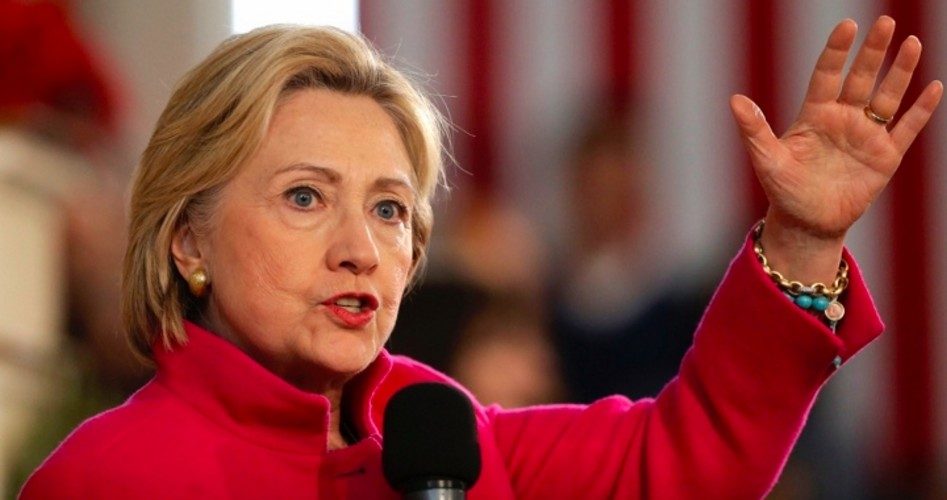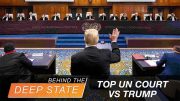
Does Hillary Clinton accept the idea of profiling Muslims? Apparently the answer is yes — at least insofar as the 2001 Hillary goes. Because while being interviewed by This Week’s Sam Donaldson the Sunday after 9/11, then-Senator Clinton was quite amenable to the idea. Perhaps we can say, she was for it before she was against it.
Fast-forward to today and we have the 2015 Hillary. She made the claim at the last Democrat debate that Donald Trump is sending “discriminatory messages” and that Da’esh (ISIS) is “showing videos of Donald Trump insulting Islam and Muslims in order to recruit more radical jihadists.” This has been proven false, and Trump, showing his usual circumspection, responded by saying that Clinton “lies like crazy about everything.” Yet one could wonder: Was Clinton lying in 2001 when she sent her discriminatory message in profiling’s favor? Or was it a moment of clarity?
As for a moment of verity, it is Clinton who appears in a Da’esh recruitment video (shown below) — Bill Clinton, that is. It seems they have him profiled as a “fornicator,” as that’s precisely what they label him when mentioning the kind of people for whom Western Muslims shouldn’t fight.
https://www.youtube.com/watch?v=<span style="font-size: 12px;">OAbuO_fhHn8</span>
As for Hillary Clinton’s ideas on fighting jihadism, while talking to Donaldson five days after 9/11, she said with conviction that “everyone recognizes we have to tighten security. We have to do whatever it takes to keep our people safe.” This prompted Donaldson to ask, “Including profiling, senator?” Clinton then responded (video below), without missing a beat or even the slightest equivocation:
I think we have to do whatever it takes, Sam. And I believe that, you know, Tuesday changed everything. Tuesday was a day that America has never, ever had to experience. And I hope to heaven that we never have to again. But we are in a war situation, andwe’re going to have to do things people do in times of war.
“Whatever it takes….” Of course, it would take an honest media to actually confront Clinton with her apparent contradictions. She certainly could say that she qualified her statement to Donaldson, but a diligent reporter would then feel compelled to ask some logical questions regarding her position on profiling:
• If 9/11 “changed everything,” has something changed it back?
• If so, what?
• Are we no longer in “times of war”?
• If not, then can you say the “War on Terror” is over?
• If it was legitimate to profile Muslims after 9/11, is it still legitimate now?
• If not, why?
Of course, while advocacy of “profiling” wouldn’t play well with Clinton’s liberal base, the practice is actually the basis of all good policing — and lots of other things. After all, profiling is merely, as Dr. Walter Williams wrote in 2009, “a practice where people use an observable or known physical attribute as a proxy or estimator of some other unobservable or unknown attribute.” And it’s often necessary because, to paraphrase Williams, profiling enables us to make determinations based on scant information when the cost of obtaining more information is too high. As an example, as I wrote three weeks ago: “An Israeli airport-security agent could make far better judgments if he could spend a month living with every prospective traveler, getting to know him and his family. But since this is unrealistic, the agent has to assess probabilities based on the little information he has. And rest assured that the Israelis scrutinize young Muslim men far more closely than elderly Norwegian grandmothers.”
Yet profiling’s focus isn’t limited to “minorities.” As I also explained, “If a white man is cruising a bad neighborhood in an expensive car, the police may stop him because they know the probability is relatively high he’s there to buy drugs. And at one time part of the profile of someone in the methamphetamine trade was “white,” as white motorcycle gangs used to be its main players.” Moreover, after the San Bernardino terrorist act, MSNBC and CNN suggested, respectively, that it might be the work of pro-lifers (profile: “white”) or militia types (profile: “white”).
Nor is the exercise of profiling limited to law enforcement. For instance, Dr. Williams mentions that since the “Pima Indians of Arizona have the world’s highest diabetes rates” and “Prostate cancer is nearly twice as common among black men as white men,” doctors may scrutinize these groups more closely for such diseases. He also points out that physicians “order routine mammograms for their 40-year and older female patients but not their male patients” and then writes, “Because of a correlation between race, sex and disease, the physician is using a cheap-to-observe characteristic, such as race or sex, as an estimate for a more costly-to-observe characteristic, the presence of a disease. The physician is practicing both race and sex profiling. Does that make the physician a racist or sexist?”
And, of course, profiling doesn’t become invalid just because it becomes politically incorrect. As Williams wrote in a 2004 piece:
Just as race and ethnicity are not perfect indicators of the risk of certain diseases, neither is race a perfect indicator of criminal activity, but they are associations, and people act on those associations.
A Washington, D.C., taxicab commissioner, who is black, issued a safety advisory urging D.C.’s 6,800 cabbies to refuse to pick up “dangerous looking” passengers. She described “dangerous looking” as a “young black guy … with shirttail hanging down longer than his coat, baggy pants, unlaced tennis shoes.” By no stretch of imagination does every young black person pose a threat to taxi drivers, but in Washington, D.C., and other cities, there’s a strong correlation between race and the threat of robbery/murder.
Lastly, the practice of profiling isn’t limited to just whites or conservatives. Black left-wing racial activist Jesse Jackson said in 1996, “There is nothing more painful to me … than to walk down the street and hear footsteps and start thinking about robbery, then look around and see somebody white and feel relieved.” And black pundit Juan Williams lost his NPR contract in 2010 after saying he gets “worried” and “nervous” when seeing people in “Muslim garb” on a plane.
As for profiling politicians, Hillary Clinton reflects a certain group, one famous for being “for it before being against it” (or the reverse). Clinton’s successor as secretary of state, John Kerry, made the quip famous when rendering a statement in 2004 about an appropriations bill. Her former boss, Barack Obama, said in 2004 that he wouldn’t run for the presidency in 2008 because he believes in “knowing what you’re doing when you apply for a job,” but then ran for it anyway. And Clinton was against faux marriage in 2004 before she was for it — just in time to run for the presidency herself.
So perhaps we should pay heed to the 2001 and 2004 Hillary Clintons. After all, many would agree that we’d now be much better off if we listened to the 2004 Barack Obama.
Photo of Hillary Clinton: AP Images


